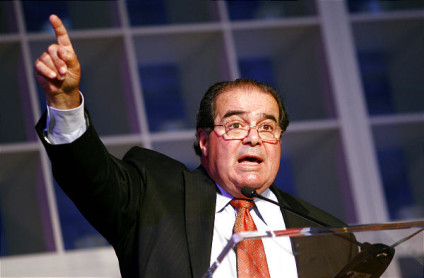Scalia: Not As Originalist As He’d Like to Think

So, by now everyone knows that Supreme Court Justice Antonin Scalia died over the weekend. As is usual, everyone is rushing to the airwaves to talk about what a nice and brilliant person he was. Of course I don’t know him personally, but certainly his public personae were not so nice, and I don’t think his legal reasoning, considered by many to be smart and original (pun intended), was all that brilliant. It was merely partisan and theocratic.
A friend texted me the news, and about my third text back to her was, it’ll be just a matter of time before Obama is accused of killing, and it took no time at all for Alex Jones to get the ball rolling. Let’s be clear; the guy was at a hunting ranch/resort in Texas when he died. We have only one government official that has the modus operandi (MO) of trying to take someone out in those circumstances, and I’m not aware of Dick Cheney being seen in public during the time this could have occurred…I’m just saying.
Seriously, Scalia was 79 years old, and while the average age of death is getting higher, plenty of 79 year olds die each year of natural causes. Scalia was overweight, and my understanding is he was a smoker. The guy just died.
However, here’s the crux of what I want to remind people about him, before we’re carving his head on Mount Rushmore. He was a vile and hateful man, even if perceived as “charming” by some. He was a jurist hearing cases not through the lenses of fairness, the rule of law, and the Constitution (despite his claims). Antonin Scalia held a particular conservative Catholic view of the world, and believed it was worth imposing on the country, and he attempted to at every turn when social issues were before the Court. He never met a cause championed by big business, the rich, and powerful that he couldn’t finesse a way to support in his opinions.
Let’s just look at a few choice Scalia-isms from the recent past:
In 2003, dissenting in the Court’s ruling outlawing sodomy laws, Scalia went out of his way to argue that states can infringe on gay rights, specifically because of how immoral he considered homosexual behavior. “State laws against bigamy, same-sex marriage, adult incest, prostitution, masturbation, adultery, fornication, bestiality, and obscenity are likewise sustainable only in light of Bowers’ validation of laws based on moral choices,” Scalia wrote, citing a previous court decision upholding an anti-sodomy law.
In 1996, he was even nastier in a dissent to a case which upheld the rights of local communities to ban discrimination based on sexual orientation, when he wrote, “Of course it is our moral heritage that one should not hate any human being or class of human beings. But I had thought that one could consider certain conduct reprehensible — murder, for example, or polygamy, or cruelty to animals — and could exhibit even ‘animus’ toward such conduct. Surely that is the only sort of ‘animus’ at issue here: moral disapproval of homosexual conduct.”
In 2012, the Court took up the Arizona anti-immigration bill, and struck down some of the provisions of the bill. Again, writing in dissent, Scalia says, “[I]n the first 100 years of the Republic, the States enacted numerous laws restricting the immigration of certain classes of aliens, including convicted criminals, indigents, persons with contagious diseases, and (in Southern States) freed blacks.” Here he’s expressing the belief that it was OK for the States to prohibit freed blacks from moving to their state.
Just this past December the court was considering a case involving the University of Texas in an affirmative action case. Here’s what Scalia commented in that case, “There are those who contend that it does not benefit African-Americans to get them into the University of Texas where they do not do well, as opposed to having them go to a less advanced school, a less – a slower-track school where they do well. One of the briefs pointed out that… most of the black scientists in this country don’t come from schools like the University of Texas.”
So you are welcome to call him some influential grand pubah of conservative legal thought, but I see a man trapped in the 1950s whose homophobia is matched only by his racism. He is not a giant of intellectualism; he’s a guy with a word-a-day calendar.

Pingback:Cruz Goes Even More Crazy | Deep Something